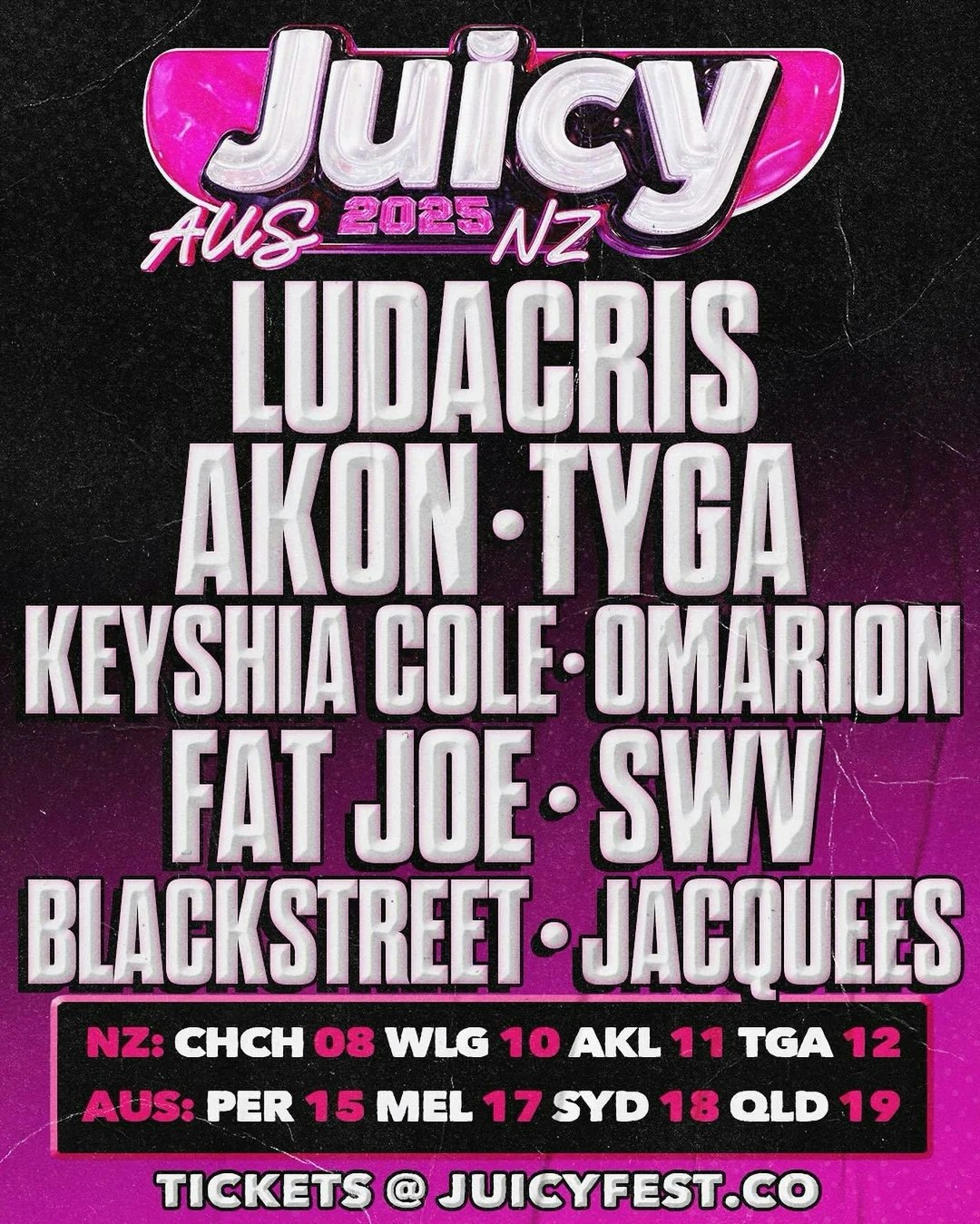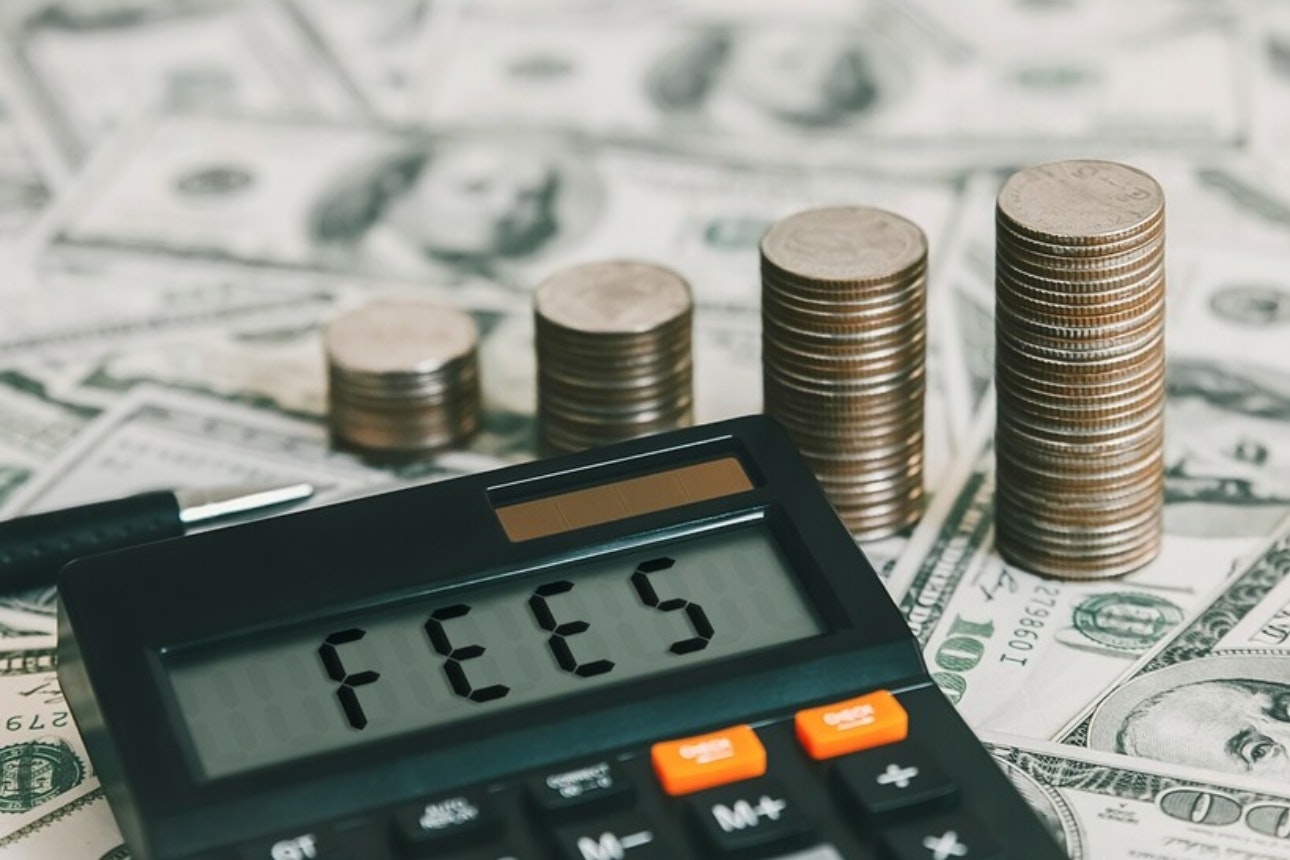
By Chris Schulz
Investigative Journalist | Kaipūrongo Whakatewhatewha
A series of cancelled concerts and failed festivals has left businesses in liquidation and consumers out of pocket. But a Consumer NZ investigation finds new initiatives may give ticket holders more confidence.

When Hope* purchased two music festival tickets in May, 2024, the event was more than half a year away. She didn’t mind – she was excited about the line-up for Juicy Fest, an annual hip-hop and R&B festival that travels the country every January, visiting Auckland, Wellington, Christchurch and Tauranga. She’d been twice before, and says: “I wanted to go again. I really liked the line-up.”

Original Juicy Fest lineup announced in June 2024.
Organisers had announced the festival would feature some of her favourite artists, the rap performer Ludacris, who would be performing in Aotearoa for the first time, and the R&B singer Omarion. So, Hope spent $700 on VIP tickets to the Auckland festival for her and a friend to attend together. Those tickets promised to get her closer to the stage and access to an exclusive bar and executive toilets.
A few months later, worrying signs emerged when Tyga and Blackstreet were removed from the bill. Then, in November, SWV, Omarion, and the Ying Yang Twins pulled out, quickly followed by Keyshia Cole. Some of these were the acts that had first made Hope decide to buy her tickets. Yet she remained committed to the festival. “I was still keen to go,” she says. “There were still people on the bill who I wanted to see.”
Soon, however, came news that made Hope question that decision.
A quest for refunds begins
On 20 December 2024, Juicy Fest made the call no ticket holder ever wants to hear: every single one of its four Aotearoa events was being cancelled. In a statement, organisers blamed opposition to liquor licenses and said there were concerns about “previous antisocial behaviours from some Juicy Fest attendees in Auckland and Wellington”. They asked for patience around refunds as “this is not an easy task with multiple events and thousands of customers”.
Hope requested her refund immediately. In a series of direct messages sent via Instagram and seen by Consumer NZ, she asked Juicy Fest organisers for more information. She received bland, generic replies: “We will be working through this process in coming weeks,” and, “the refund process has started”.
This is when Hope began to believe something might be amiss. “Every other time I’ve been to an event that’s been cancelled, they’ve refunded you straight away,” she says. “When they didn’t do that [this time], I was like, ‘This seems dodgy’.”
Her and every other ticket holders’ worst fears were realised in March this year, when the company behind Juicy Fest went into liquidation. This also affected four more festival dates on the Timeless Summer Tour, a nostalgia-based event run by the same promotions’ companies. All up, it meant up to 80,000 ticket holders were potentially out of pocket, waiting in line as a lengthy liquidation process began.
Hope immediately joined a Facebook group for irked Juicy Fest ticket holders. Nearly 6,000 members shared links to online creditor meetings and swapped notes about other ways they may be able to access their refunds. But, by the end of February, three months on from the Juicy Fest cancellation, Hope was starting to lose faith she’d ever see her money again.
Why are so many concerts being cancelled?
The liquidation of Juicy Fest and Timeless Summer Tour caused the demise of eight summer festivals. But many other shows have been affected across a year of concert carnage. In the past 12 months, Tenacious D, Blink-182, Xzibit, Public Enemy and Nelly have all cancelled performances, while the rock festival Paradise City was cancelled, Travis Scott moved his Auckland show forward a day, and Drake moved his two Auckland shows back by two weeks – then postponed them only to wait five months and cancel them entirely. Bay Dreams and Splore, two high-profile annual festivals, have both skipped 2025.
Layton Lillas, the president of the New Zealand Promoters Association (NZPA), blames the post-COVID effect. After two years of a pandemic and lockdowns, every act wanted to tour, and people wanted to go to shows again. Now, “there was this glut of product in the market, and there were winners and losers … it was too much of a good thing.”
Lillas believes boom times encourage cowboys to enter the market. “It's such a sexy industry, but anyone who has been in it for 100 years knows there’s much more to it than what people see from the outside,” he says. “People come in, they don’t realise what they’re doing. They think that, just by putting some artists’ name on a bill, the people are going to come out of the woodwork en masse, and they’ll make millions of dollars. As we all know, it’s not like that.”

The problem, says Lillas, is that there is no law requiring ticketing companies to ring-fence the proceeds of ticket sales, withholding it from promoters until after the event. This would ensure ticket holders’ money remained available if refunds were required. “All the funds should be in a ring-fenced escrow account, a trust account, not touched by anybody until the event happened,” Lillas says. “Then, when the event happened, the ticket money would be taken out and released for the promoter.”
The only Juicy Fest and Timeless Summer Tour ticket holders getting their money back directly from a ticketing company are those who purchased tickets via Ticketek for the Timeless Summer Tour’s Bowl of Brooklands show in New Plymouth. That’s because Ticketek adheres to the New Zealand Ticketing Code of Practice, a voluntary programme that guarantees ticket holders will receive refunds.
All other tickets were sold via the ticketing platform Ticket Fairy. In a statement, a spokesperson said: “For Juicy Fest NZ, Ticket Fairy has never held nor controlled ticket funds at any point in time … All ticket sales were processed directly by the promoter, indicated by both pre-purchase and post-purchase disclaimers, and your bank or card statements.”
Everyone else is left dealing with their credit or debit card companies in an attempt to get a chargeback or joining a long list of unsecured creditors in a process that could take many years. “That money’s probably sucked up into a vortex,” says Lillas. “And it’s not there anymore.”
How ticket buyers can stay safe
Elaine Linnell, general manager for the New Zealand Events Association, says times are tough for promoters. Rising costs for everything from shipping to staff are being passed on to consumers, and licensing issues are adding further woes. Promoters are also having to navigate rapidly changing consumer behaviour. “People are booking later, prioritising different experiences, and, in some cases, tightening their spending due to economic pressures,” she says. “This makes it more difficult for organisers to predict attendance and manage cash flow.”
Some promoters, though, are opening their books and revealing how they manage to make things work. Earlier this year, organisers behind the Christchurch festival Electric Avenue did something few promoters ever do: they released their costings to the public. They admitted they spent $12 million in total on their festival, including $5.5 million on artists and hotels, $3 million on the venue and $400,000 on security.
This, says Layton Lillas, is a new trend and shows that promoters who have nothing to hide are being upfront with their customers. He warns ticket holders to do their research and look at what the organisers behind the events they want to go to are saying and doing, as well as their history. “You need to be careful when it’s a non-reputable promoter or a ticketing company that you’ve never heard of,” he says.

To help music fans with their research, NZPA’s website contains a list of promoters and event companies that have opened their books and been vetted, verified and approved. “It’s a bit like a master builders’ ticket,” Lillas says. “It’s so you know there’s some foundation behind them. They've clearly got a track record; they've clearly got integrity, and it’s been checked by the industry. That’s how you can know you’re dealing with a reputable company.”
At NZPA’s next AGM, Lillas says they’ll be deciding on a logo for a verification badge that these promoters will be able to use to give ticket buyers an assurance they’re buying from the right people. This should be in place by next summer, he says, improving confidence for punters who just want to know whether their concert is going ahead. Until there’s a law requiring ticketing money to be ring-fenced, he says it’s the best they can do. “We need that trust tick,” he says.
How Hope got her money back
By March, Hope had had enough. She approached her credit card company and asked if she could claim a chargeback. She filled out a few forms, sent in her receipts and links to news reports that Juicy Fest was in fact cancelled, and soon found the charge had been reversed and money had been credited to her card.
She knows she’s one of the lucky ones. On social media, she sees the posts, and reads the stories from angry Juicy Fest ticket holders who are still waiting. “I feel sorry for the people who had bought the VVIP tickets,” she says. “There was a woman on Instagram who said she’d bought tickets for her daughters, for their birthdays. It was thousands of dollars. How does it feel for those people?”
She hopes NZPA’s verification tick is in place by the time she starts buying tickets for next summer. Until then, she says she’ll be taking Lillas’ advice and investigating who’s behind any festivals she wants to attend to see if they have a history of putting on reliable events.
She’ll also be doing the thing no promoter wants any ticket buyer to do – waiting until the last minute to get her tickets. “I just want to make sure they’re going to happen,” Hope says. After the past year, she’s far from the only one.
What to do when your concert is cancelled
If your event is cancelled or postponed, you’re entitled to a refund. Check the event website for updates or call the ticket agent directly.
If it’s taking too long, and you purchased your tickets using a credit or debit card, you can apply for a chargeback. Approach your credit company to ask how.
You can also lodge a claim with the Disputes Tribunal, and lay a complaint with the Commerce Commission.
For more advice on your rights with tickets and events, see our article on Tickets and events: your rights.
Learn more about the Entertainment Venues Association of New Zealand Ticketing Code of Practice.
The NZPA lists verified promoters on its who we are page on its website.

We know your rights
Got a problem with a faulty product, received shoddy service or been misled by a retailer? Our expert advisers can provide clear, practical advice that you can trust.



